Results
-
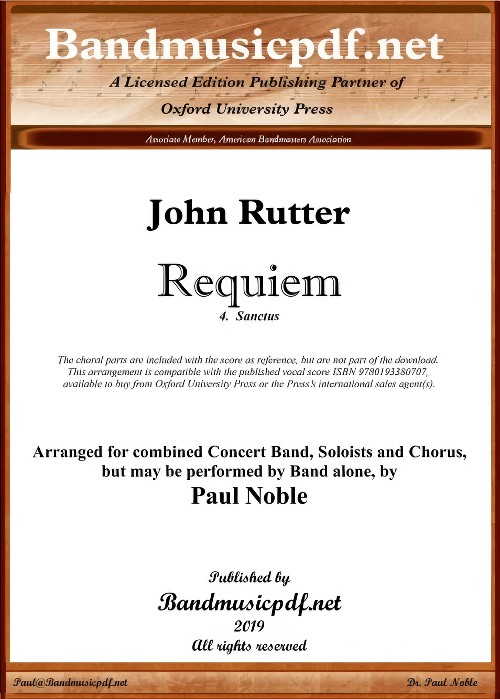 £110.00
£110.00Sanctus (from Requiem) (Concert Band with Optional Choir - Score and Parts) - Rutter, John - Noble, Paul
John Rutter's Requiem is a musical setting of parts of the Latin Requiem with added psalms and biblical verses in English, completed in 1985. This arrangement is scored for soprano, mixed choir and Concert/Wind Band. It may be performed by band alone. Five of its seven movements are based on text from the Latin Requiem Mass, while the second movement is a setting of Out of the deep (Psalm 130) and the sixth movement is an anthem The Lord is my Shepherd (Psalm 23) which Rutter had earlier written. The cello solo of the second movement is maintained, but also scored as a bassoon solo. The first movement combines the Introit and Kyrie, the third is Pie Jesu, with soprano solo. The central movement is a lively Sanctus, followed by Agnus Dei and finally Lux aeterna. In the Agnus Dei and Lux aeterna, Rutter combines the liturgical Latin text with English biblical verses. The arranger has added the tolling of the bell at the end, which can be as few or as many as may be appropriate for the occasion.
Estimated dispatch 7-14 working days
-
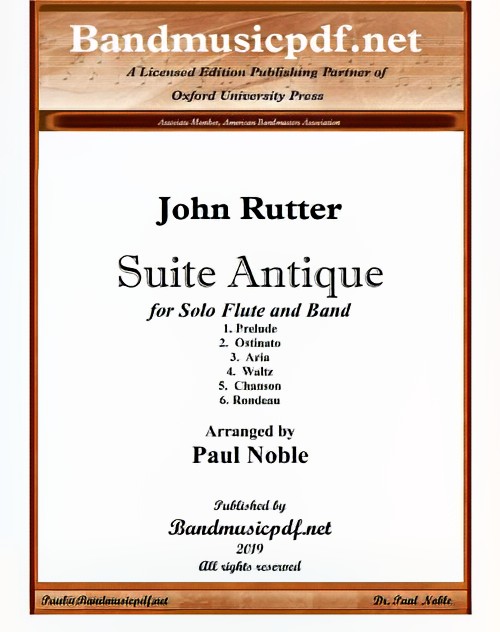 £395.00
£395.00Suite Antique (Flute Solo with Concert Band - Score and Parts) - Rutter, John - Noble, Paul
Suite Antique is a 1979 concertante work by John Rutter that is written for harpsichord, flute and string orchestra. Rutter composed the piece, in six movements, for a concert at which Bach's fifth Brandenburg concerto was to be performed, and so decided to write the piece for the same ensemble. This arrangement for Concert/Wind Band and Solo Flute adheres to the original presentation, but is expanded for a full band accompaniment to the solo flute. The harpsichord is optional, being cued elsewhere, but may be performed as in the original score by either harpsichord or an electronic keyboard with a similar setting. A jazz drumset is optionally included in the fourth (jazz waltz) movement, and other percussion discretely added in other movements. It is exciting to hear earlier musical forms brought into today's music appreciation, and this setting of a flute solo with band is especially refreshing for both soloist and band.
Estimated dispatch 7-14 working days
-
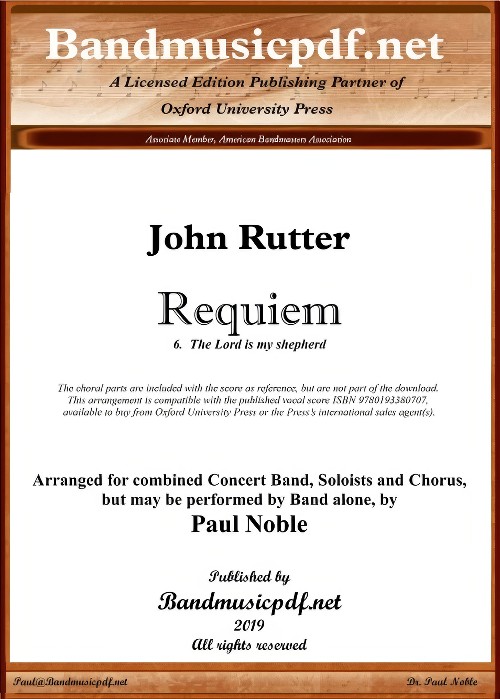 £110.00
£110.00The Lord is My Shepherd (from Requiem) (Concert Band with Optional Choir - Score and Parts) - Rutter, John - Noble, Paul
John Rutter's Requiem is a musical setting of parts of the Latin Requiem with added psalms and biblical verses in English, completed in 1985. This arrangement is scored for soprano, mixed choir and Concert/Wind Band. It may be performed by band alone. Five of its seven movements are based on text from the Latin Requiem Mass, while the second movement is a setting of Out of the deep (Psalm 130) and the sixth movement is an anthem The Lord is my Shepherd (Psalm 23) which Rutter had earlier written. The cello solo of the second movement is maintained, but also scored as a bassoon solo. The first movement combines the Introit and Kyrie, the third is Pie Jesu, with soprano solo. The central movement is a lively Sanctus, followed by Agnus Dei and finally Lux aeterna. In the Agnus Dei and Lux aeterna, Rutter combines the liturgical Latin text with English biblical verses. The arranger has added the tolling of the bell at the end, which can be as few or as many as may be appropriate for the occasion.
Estimated dispatch 7-14 working days
-
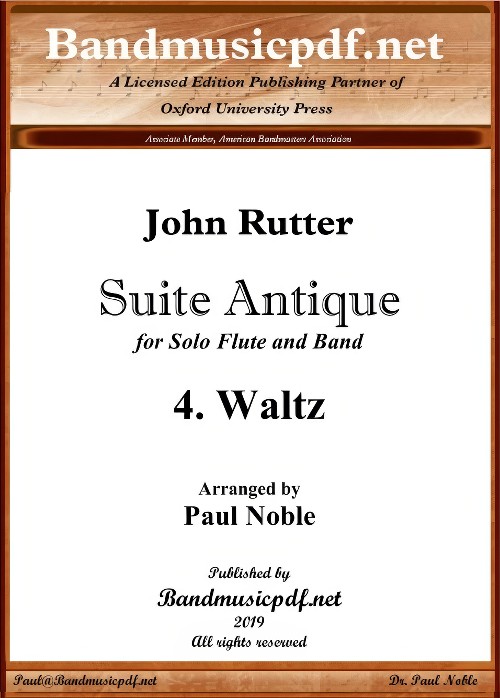 £110.00
£110.00Waltz (from Suite Antique) (Flute Solo with Concert Band - Score and Parts) - Rutter, John - Noble, Paul
Suite Antique is a 1979 concertante work by John Rutter that is written for harpsichord, flute and string orchestra. Rutter composed the piece, in six movements, for a concert at which Bach's fifth Brandenburg concerto was to be performed, and so decided to write the piece for the same ensemble. This arrangement for Concert/Wind Band and Solo Flute adheres to the original presentation, but is expanded for a full band accompaniment to the solo flute. The harpsichord is optional, being cued elsewhere, but may be performed as in the original score by either harpsichord or an electronic keyboard with a similar setting. A jazz drumset is optionally included in the fourth (jazz waltz) movement, and other percussion discretely added in other movements. It is exciting to hear earlier musical forms brought into today's music appreciation, and this setting of a flute solo with band is especially refreshing for both soloist and band.
Estimated dispatch 7-14 working days
-
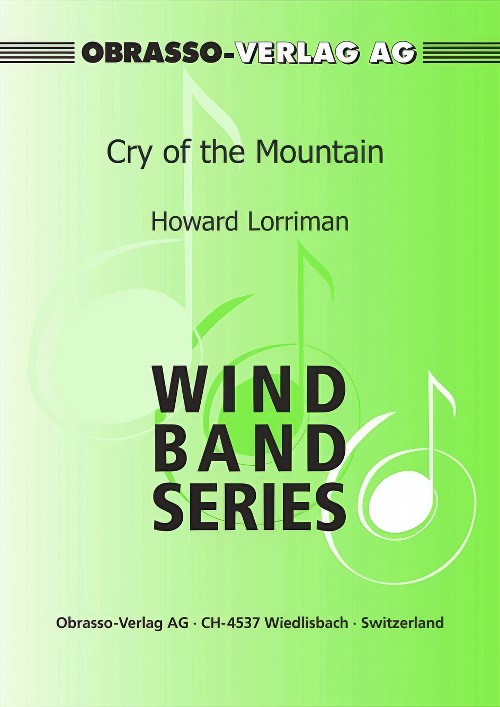 £125.30
£125.30Cry of the Mountain (Concert Band - Score and Parts) - Lorriman, Howard
This work is dedicated to Manfred Obrecht, conductor and musical editor. Manfred asked the composer to write a piece that captures the changing colours and mood of a mountain when viewed from a relatively close distance. The work is in four sections:Awakening - early morning and the mountain is covered in cloud, eventually the sun bursts through and reveals the mountain in all its glory.Snow, Ice and Glaciers - between the rocky out-crops ther are layers of snow; slippery ice patches and icicles adorn the overhangs. In the larger crevices and valleys glaciers are formed.Vistas and Distant Peaks - when viewed from other high points one can see the mountain in full outline against the vast landscape.Avalanche - despite its beauty, a mountain can be a dangerous place and the accumulated snow may not be stable, it can easily tumble out of control. The slight twist of major tonalities at the very end reflects the way a sudden change in light can alter the whole perspective.
Estimated dispatch 7-14 working days
-
 £9.99
£9.99Christmas Collection - Words and music (piano)
Christmas Collection is a newly revised carol book with original, additional and rearranged carols from New Christmas Praise as well as 10 extended pieces. Parts are now also available in large print A4 size!Titles:A child this day is bornA Christmas lullabyA great and mighty wonderAll my heart this night rejoicesAngels, from the realms of Glory (Come and worship)Angels, from the realms of Glory (Iris)Angels we have heard on highA starry nightAs with gladness men of oldA virgin most pureAway in a manger (The manger scene)Away in a manger (Traditional)BethlehemBrightest and best (Spean)Brightest and best (Traditional)Calypso CarolCarol for the NativityCarol of the drumChild of MaryChristians AwakeChrist is born (Il est n)Christ was born on Christmas DayCome and join the celebrationCome, children, come quicklyCoventry CarolDing dong! merrily on highDo you hear what I hear?Gabriel's MessageGaudeteGlory in the highestGlory in the highest HeavenGod of God, the uncreatedGod rest you merry, gentlemenGood Christian men, rejoiceGood King WenceslasGo, tell it on the mountain!Hark the glad sound!Hark! the herald angels singHow far is it to Bethlehem?Huron CarolInfant HolyIn the bleak midwinter (Cranham)In the bleak midwinter (Darke)I saw three ships come sailing inIt came upon the midnight clear (Traditional)It came upon the midnight clear (Willis)I wonder as I wanderJesus, good above all otherJoy to the world!Little baby JesusLittle children, wake and listenLittle DonkeyLittle Jesus, sweetly sleepLo! he comes with clouds descendingLong, long agoLove came down at ChristmasMary's boy childMary's ChildMasters in this hallNoelO come, all ye faithfulO come, ImmanuelO Heaven-sent KingO holy night!O little town of Bethlehem (Christmas Carol)O little town of Bethlehem (Forest Green)O little town of Bethlehem (St Louis)Once in royal David's cityPast three o'clockPersonent HodiePraise ye the LordRing the bellsRise up, shepherd!Sans day carolSaviour's DaySee, amid the winter's snowSilent Night!Softly the night is sleepingStars are shiningStill, still, stillSussex CarolSweet chiming bellsSweet chiming Christmas bellsThe candle songThe cherry tree carolThe first NowellThe holly and the ivyThe infant KingThe light has comeThe shepherds' farewellThe stable doorThe star in the eastThe virgin Mary had a baby boyThey all were looking for a kingThou didst leave thy throneThree kings' marchUnto us a boy is bornWe gather round the manger-bedWe three kings of Orient areWhat child is this?Whence is that goodly fragrance flowing?When wise men came seekingWhile shepherds watched (Cranbrook)While shepherds watched (Handel)While shepherds watched (Winchester Old)Who is he?Zither Carol
Estimated dispatch 7-14 working days
-
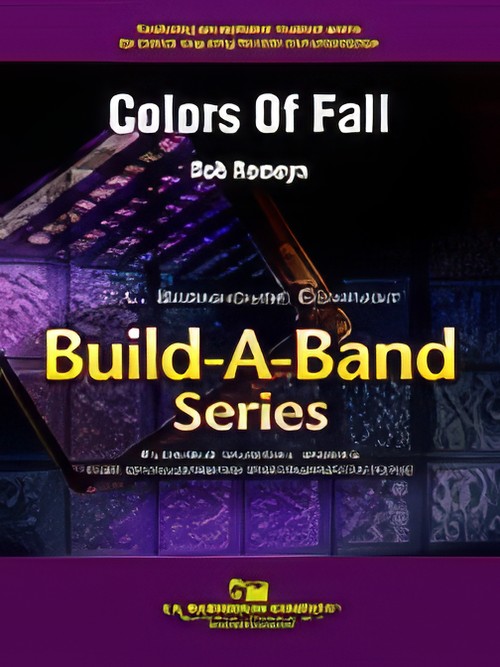 £55.00
£55.00Colors of Fall (Flexible Ensemble - Score and Parts) - Romeyn, Rob
As an outstanding example of lyric and expressive music for young bands, "Colors of Fall" has become a mainstay for concert and festival use. Varied textures and changing tonal colors convey the image of breathtaking fall foliage. The beautiful and haunting melody is presented in a variety of ways melodically and harmonically, offering a wonderful opportunity for a mature and sophisticated sound for the young band, as well as invaluable teaching opportunities. This arrangement for "Build A Band" ensures success with even the most awkward of instrumentations. Don't miss this outstanding lyric selection! Duration: 2.30
Estimated dispatch 7-14 working days
-
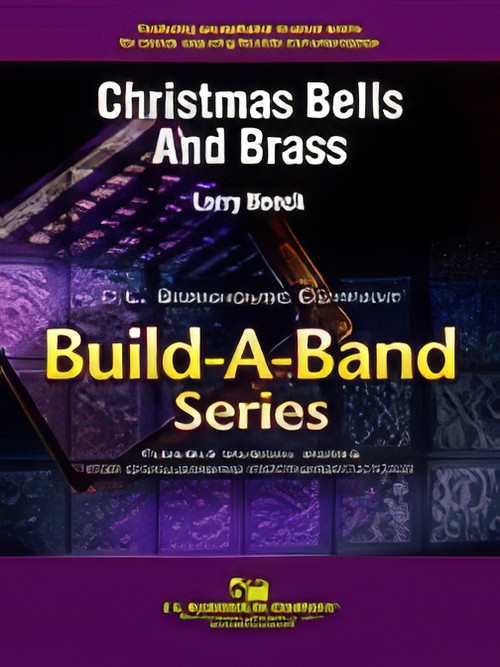 £55.00
£55.00Christmas Bells and Brass (Flexible Ensemble - Score and Parts) - Neeck, Larry
Get your band into the holiday spirit with this unique and very playable work! Carols included are O Come All Ye Faithful, Deck The Halls, Silent Night, and Jingle Bells. You will find this unique arrangement musically and educationally satisfying, and this Build-A-Band edition is perfect for those ensembles with incomplete or awkward instrumentations. An excellent choice for your next holiday concert, Christmas Bells and Brass will appeal to audience and band members alike, and your band will sound like gold!Duration: 2.45
Estimated dispatch 7-14 working days
-
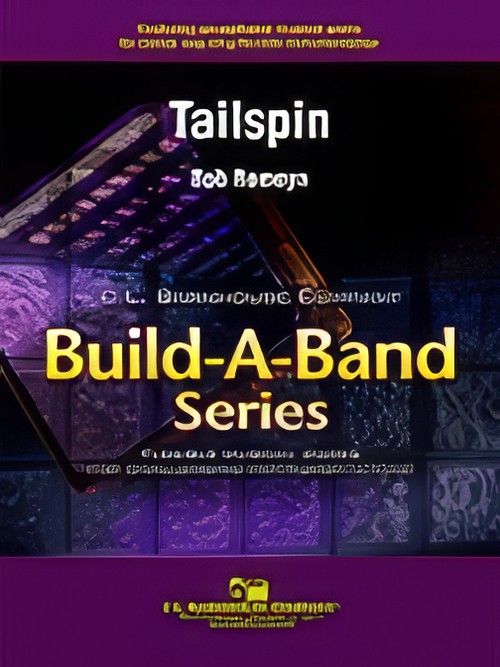 £60.00
£60.00Tailspin (Flexible Ensemble - Score and Parts) - Romeyn, Rob
Inspired by a memorable commuter jet trip taken by the composer, "Tailspin!" is an aggressive and hard hitting composition capturing the peril of an airliner in rapid descent. Contemporary harmonies and driving rhythms contribute to the unique and fresh sound of this work. Varied dynamics and textures add to the drama and make this the perfect concert or festival work for young bands. This arrangement for the "Build A Band" series ensures success with even the most awkward of instrumentations. An optional keyboard/piano part is included. "Tailspin!" Has the excitement and power that students love! Duration: 2.45
Estimated dispatch 7-14 working days
-
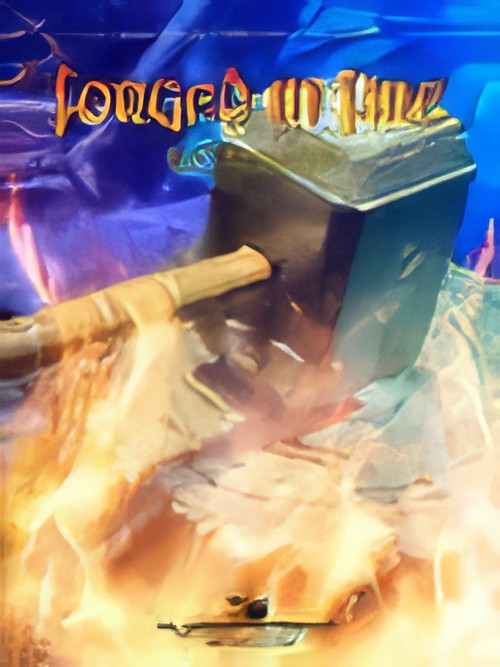 £84.00
£84.00Forged in Fire (Concert Band - Score and Parts) - Romeyn, Rob
An epic programmatic piece, "Forged In Fire" is a work of vibrant energy, vivid color and immense power. It draws inspiration from the immense power and uses of fire, and its effect on early civilization and industrialization. A calm and sensitive introductions leads to a new theme at a quickening tempo. This theme, stated simply at first, is then embellished by a driving rhythm multi-meter effect, and further developed with layered contemporary harmonies, changing textures and variations on the theme. After a breathtaking climax, the original theme is restated, more powerfully this time. It then subsides, before building to a shimmering, red hot ending that will leave your audience breathless. Certain to become a mainstay for concert and festival use. Not to be missed! Duration: 4.45
Estimated dispatch 7-14 working days
